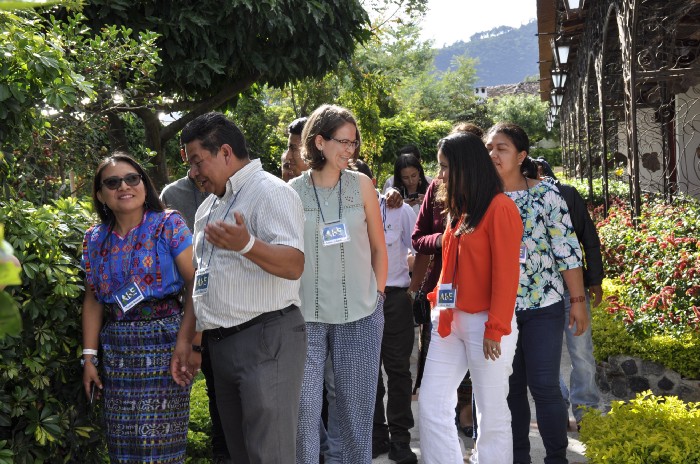Guatemala holds its first National Forum on Ecosystem-based Adaptation
At the National Forum on Ecosystem-based Adaptation in Guatemala, various stakeholders recognized in a written declaration the urgent need to scale-up nature-based solutions
by Marai El Fassi | 2019-12-21

Until now, Ecosystem-based Adaptation (EbA) did not feature on Guatemala`s environmental policy agenda. The recent National Forum on EbA was the first time that actors from various sectors came together to generate a common vision for EbA in Guatemala. A group composed of government institutes, conservation NGOs, and international cooperation agencies organised the three-day event in November 2019 in the Guatemalan city of Antigua. These included The Nature Conservancy, The National Forestry Institute , FAO , IUCN , UNDP , GIZ, as well as WWF , ADIMI and TMG Research, implementing organisations of the SDG-Climate Integration Project in Guatemala [1]. The forum concluded with formal recognition of EbA as an effective strategy to scale-up climate change adaptation efforts nationally.
Why EbA is so important for Guatemala
Guatemala is a megadiverse country [2] that is highly vulnerable to the repercussions of climate change. Unpredictable rainfall patterns, degraded soils and increasing flooding hit the poorest segments of society hardest. Persistent poverty adds to the challenge; Guatemala is one of very few countries in the world where poverty has increased in recent years.
EbA is increasingly recognized as a powerful approach that can enhance the adaptive capacity of communities and ecosystems. Many EbA projects are already underway in Guatemala, but these tend to be disconnected. A more coordinated approach is needed to sustainably scale up adaptation initiatives.
New alliances for unprecedented challenges
During the first two days of the Forum, 135 representatives exchanged experiences of EbA in Guatemala, discussed the scope and limitations of national adaptation strategies, and financial mechanisms for EbA. Recognizing EbA´s potential, the Ministry of Environment and Natural Resources (MARN) stated that “EbA is strategic for Guatemala” in the sense of achieving the country´s national development goals, as well as meeting international commitments such as Agenda 2030 (the UN Sustainable Development Goals) and the Paris Agreement. On the third day, possible steps and commitments to upscale EbA were discussed in a political dialogue, involving close to seventy decision-makers from the public and private sectors. The establishment of a financing mechanism for EbA was one of the key proposals made for scaling up nature-based solutions.

Participants during the first National EbA Forum in Antigua, Guatemala.
Actors recognize the importance of EbA in a signed declaration
The event culminated in a written declaration that recognizes the need to implement EbA on a larger scale in Guatemala and learn from local experiences. This represents a considerable achievement given that, until recently, EbA has not featured in political discussions in the country. The signatories committed themselves to strengthen alliances for EbA and creating enabling conditions for its national scaling up. The Declaration was signed by the representatives of several ministries, leading environmental NGOs, universities, and UN bodies. These included the Ministry of Environment and Natural Resources (MARN), the Ministry of Agriculture, Livestock and Food (MAGA), the National Council of Protected Areas (CONAP), the National Forestry Institute (INAB), IUCN, WWF, The Nature Conservancy, and Rainforest Alliance.
Fostering EbA through new alliances
Building alliances for EbA is at the core of the above-mentioned SDG-Climate Integration Project in Guatemala. The project focuses specifically on widening social and political support in order to create an enabling environment for EbA. One innovative aspect of the project was the formation of a Technical Group of key EbA actors in the country. Just as the National EbA Forum and the Declaration have placed EbA on the policy agenda and point the way towards a national roadmap for EbA scaling, the Technical Group will follow up on the inter-institutional alliances and commitments mentioned in the Declaration. This joint effort will be crucial, especially as a new government takes office in January 2020. The Forum and the Declaration are inspiring first steps towards nature-based solutions. However, an effective follow-up will require concrete actions. The new alliances support that this political commitment yields policies and programmes that create the conditions for the upscaling of EbA in Guatemala.
[1] The project is funded by the German Federal Environmental Ministry under its International Climate Initiative, and seeks to support the implementation of the Paris Agreement and the 2030 Agenda through Ecosystem-based Adaptation”
[2] The term Megadiversity Countries refers to the world’s most biodiverse countries. This country-focused mapping raises awareness of the need for conservation in nations with high biological diversity, with many species unique to each country
 Urban Food FuturesFeb 09, 2026
Urban Food FuturesFeb 09, 2026Pushing the horizon: Urban farming and community-led innovation in Mukuru informal settlement
A small community-run greenhouse in Mukuru is offering insights into how controlled-environment agriculture can strengthen food security in urban environments under increasing pressure—and a look into the future of food systems in informal settlements.
Christian Sonntag, Emmanuel Atamba, Lumi Youm
 Land GovernanceDec 18, 2025
Land GovernanceDec 18, 2025Land tenure, women’s land rights, and resilience: Reflections from CRIC23 toward UNCCD COP17
Our experts discuss what the exchanges at CRIC23 highlighted and revealed about the role of secure and gender-equitable land tenure in the UNCCD's work ahead of the 2026 triple COP year.
Frederike Klümper, Washe Kazungu
 Urban Food FuturesDec 09, 2025
Urban Food FuturesDec 09, 2025The story of Mukuru's Urban Nutrition Hub
In Mukuru informal settlement, a safe haven for women has grown into the Urban Nutrition Hub, a multi-purpose space for nutrition education, training, and community development, demonstrating the potential of grassroots community-owned innovation..
Serah Kiragu-Wissler


